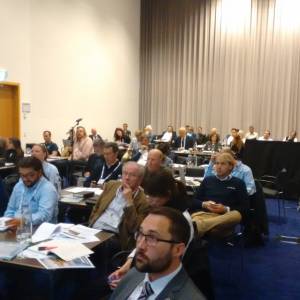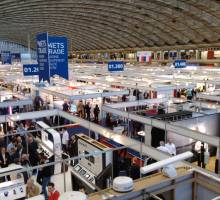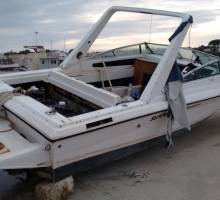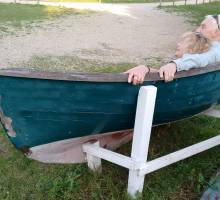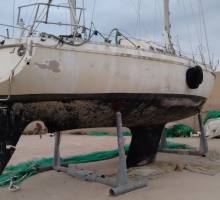
The Future of Yacht Recycling Conference - 2015
Neil Chapman Founder and CEO of Boatshed.com was asked to speak at the The Future of Yacht Recycling Conference, which was held during the 2015 METS exhibition in Holland. There were a variety of speakers and the conference highlighted a whole range of potential issues surrounding end-of-life boats and a need potentially to recycle some of these in the future.
It was interesting from Boatshed’s perspective because Neil highlighted the need to develop better sales channels as clearly there are issues for marina operators and yard operators who face abandoned boats in their yards, many of which still have the potential to be sold.
As Neil Chapman pointed out in his speech, the Boatshed "project boats" section gets an awful lot of attention and whilst many feel that a boat is at end-of-life stage, very often it may be at end-of-use stage and there may still be ongoing potential for the boat to be used by different parties. Boatshed already works with Charities such as RNLI and Sail for Cancer helping with legacy sales, plus selling significant numbers of unwanted or abandoned vessels for marinas and yards. We also have developed new sales channels such as Boatbid.com (a boat auction website) and the Marine Inspection Association.com to streamline sales and make boats sell faster.
Clearly some boat sales are more lucrative than others and whilst this area does not bring significant income for the Boatshed organisation, it does enable us to facilitate our services and work with grateful partner organisation and companies who need our help.
Below is a synopsis of the areas that Neil spoke about at the conference.

I met some very interesting and knowledgeable people which was a great pleasure :) Boatshed looks forward to working with marinas, yards and nautical associations to better facilitate recycling and avoiding potential issues surrounding end-of-life boats.
Neil Chapman
Yacht Recycling and Boat Recycling: A Perspective from Boatshed.com
At Boatshed we have now been involved in the sale of over 20,000 boats and therefore have an understanding of the current market demand and numbers of boats involved. The question for this conference is what should happen to end-of-life boats?
Boatshed’s feeling is that end-of-life boats should fall into four basic categories, Reclamation, Refurbishment, Artisan and Charity resale.
Reclamation
The first category is reclamation. This needs to be looked at across a number of different types of vessels and construction types but basically involves the disassembly of vessels and salvage of any valuable items, for example barometers, compasses, fittings and fixtures, and then the use of materials such as fibreglass for other industries such as insulation in building blocks and modern building materials. The reclamation section covers the recycling of individual fittings and materials and then bulk recycling of materials for other uses.
Refurbishment
The second section that Boatshed sees is the refurbishment section. If we consider that the main cost in construction of any boat is its hull then fibreglass hulls will in turn become more and more valuable particularly traditionally-built fibreglass hulls that utilise large quantities of fibreglass for their construction. We refer to these traditional seventies, often attractive, boats such as Nicholson's, Van de Stadt's, Contessa's, as "Classic Plastics". These boats offer the potential for refurbishment. The refurbishment could cover a range of different levels; it may be simply repainting and a basic refurbishment followed by resale or it may mean a full “keel-up” restoration, essentially creating a new boat just utilising the fibreglass hull from the old boat. The refurbishment of these boats, many of which have a cult following, could offer a significant alternative to the creation of new, modern hulls that are often not built as strongly or, by their very nature, don’t retain some of the classic lines and attractiveness of older style vessels. There are clearly significant supply chain opportunities for the marine industry in this section.
Artisan
Section three is artisan. We see this as a very niche sector however it is worthy of mention. This is whereby boats are utilised for different purposes for example architectural features; furniture features such as seating, bars, or garden and landscaping features, pubs and restaurants decor to traffic island features or landscaping. These are generally big items, weather proof and are aesthetically pleasing
Alternative/Extended use Charity Resale
The fourth section is alternative uses and charity resale. Boatshed are already actively involved with charities such as Sail for Cancer and the RNLI whereby old vessels are sold at extremely low prices to enable sellers to take a significant tax advantage but are also sold or given in the form of legacy often to sailing clubs, associations or charitable training organisations. This section, whilst it does not have significant creation of employment, does create extra enjoyment and extended use of vessels enabling individuals, children, training associations, to make use of vessels that they previously would not have access to.
The above four sections offer significant employment and commercial opportunities across all nautical nations. Boatshed has working knowledge of all four of these sections and would be happy to advise or assist in the further development of these four recycling concepts for boats.
Post Conference Note from Neil Chapman
It is interesting that at present, as far as I am aware, no new boat manufacturers are offering a solution to EOL boats in EU or USA.
- With the huge public demand and attention that surrounds this issue perhaps manufacturers should consider implementing some basic "recycling" provisions into boats that they build ?
- With a current "Boat Recycle Cost" that came out of the conference, of approx 150 to 200 GBP per Boat length meter, this is not too expensive?
- A simple addition of a couple of thousand pounds on the sale of a new boat, with the money being help in trust, means this could be easily catered for.
- Following the success of "Inbuilt Recycling" provisions made in the car industry the potential marketing creditability alone of such a plan should not be missed by new boat builders.

Who am I ? Check out my Boatshed Pagehttp://www.boatshed.com/contact-neil-chapman
